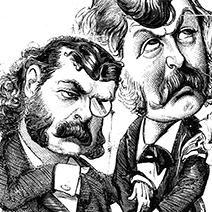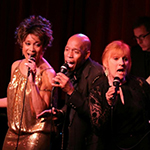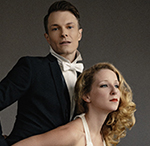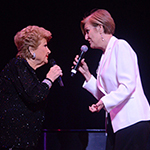Gilbert and Sullivan Unplugged
A Modern Twist on the Major Hits
Feinstein’s/54 Below, NYC, June 21, 2017
Reviewed by Marilyn Lester for Cabaret Scenes
 Back in the day, the composer Arthur Sullivan and lyricist/bookwriter William S. Gilbert were the Stephen Sondheim of their time. The duo wrote 14 operettas—the Victorian equivalent of musical theater—between 1871 and 1896. Such was their success that their works have endured into our own times, mostly just the way they were written. What the wonderfully clever and talented Gilbert and Sullivan Unplugged Players have done is take that solid source material and re-envision it for modern enjoyment. Wisely, they’ve drawn from the so-called “big three,” the most-produced and most widely known of the G&S canon—The Pirates of Penzance, H.M.S. Pinafore, and The Mikado—to apply fresh orchestrations and arrangements to basic melody lines. This group of eight actor-musicians bookended the show with the hymn-like, traditional “Hail Poetry” from The Pirates of Penzance, but in between it was all joyous irreverence and great fun, supported by grounded, top-notch vocal and instrumental skills. These Chicago-based players know the material well, having performed the operettas at venues such as American Repertory Theatre, Berkeley Repertory Theatre, Actors Theatre of Louisville, Olney Theatre Center, and the Steppenwolf Theatre Company.
Back in the day, the composer Arthur Sullivan and lyricist/bookwriter William S. Gilbert were the Stephen Sondheim of their time. The duo wrote 14 operettas—the Victorian equivalent of musical theater—between 1871 and 1896. Such was their success that their works have endured into our own times, mostly just the way they were written. What the wonderfully clever and talented Gilbert and Sullivan Unplugged Players have done is take that solid source material and re-envision it for modern enjoyment. Wisely, they’ve drawn from the so-called “big three,” the most-produced and most widely known of the G&S canon—The Pirates of Penzance, H.M.S. Pinafore, and The Mikado—to apply fresh orchestrations and arrangements to basic melody lines. This group of eight actor-musicians bookended the show with the hymn-like, traditional “Hail Poetry” from The Pirates of Penzance, but in between it was all joyous irreverence and great fun, supported by grounded, top-notch vocal and instrumental skills. These Chicago-based players know the material well, having performed the operettas at venues such as American Repertory Theatre, Berkeley Repertory Theatre, Actors Theatre of Louisville, Olney Theatre Center, and the Steppenwolf Theatre Company.
G&S works are no strangers to modification. Individual songs have long been fertile ground for parody, and the operettas themselves have been the basis for reworking, such as The Hot Mikado, The Swing Mikado, The Cool Mikado, and the Metropolitan Mikado, as well as Di Yam Gazlonim, a Yiddish version of Pirates, and Pirates! Or, Gilbert and Sullivan Plunder’d. The Unplugged Players bring a new twist to the table, primarily in deconstructing and reconstructing individual numbers with a mashup of bluegrass, folk, folk-rock, and Celtic rhythms. Musical Director of the group is Matthew Kahler (guitar/harmonica), with Katharine Carson-Groner (accordion/banjo) serving as host and “explainer general,” and Douglas Pawlik (clarinet/guitar), Dana Omar (guitar/flute/ukulele/musical saw), Lauren Vogel (violin/banjo), Daniel Goodman (mandolin), Victoria Blade (ukulele), and Erik Schroeder (guitar) rounding out the octet. Notice there’s not a pianist among them, further eliminating that “old-timey” sound associated with straight renditions of the repertoire.
Top-of-the-show numbers “Pour, Oh Pour” (Kahler, Pawlik, Goodman, Schroeder), “Three Little Maids” (Omar, Blade, Vogel), and “So Please You, Sir” (Kahler, Omar, Blade, Vogel) revealed great energy and enthusiasm, as well as a thoroughly engaging playfulness. Creative harmonies also added value to the works, along with fresh musical ideas, such as an Irish rhythm underlay to “When Frederick Was a Little Lad” (Carson-Groner). Gender-bending was a fun feature of a few numbers, including “Refrain, Audacious Tar” (Omar, Pawlik), “Sorry His Lot” (Omar, Pawlik), and “The Hours Creep on Apace” (Pawlik). The usually comic “Tit Willow” (Blade) was beautifully sung as a folk ballad, with Dana Omar’s musical saw adding texture. Similarly performed was the melodic “The Sun Whose Rays” sung by Omar, who again applied her musical saw to “Sighing Softly” (Kahler, Pawlik), treating all to an impressive saw solo. By the closing number, a semi-traditional “Modern Major General” (Kahler), it was clear that a completely enthralled audience wanted more. But alas, as Gilbert might observe, “I’m really very sorry for you all, but it’s an unjust world…,” thus no encore was forthcoming, although what had already passed was “Oh joy, oh rapture unforeseen.”






I am glad that you enjoyed the performance and our interpretations of these works! Request, on my own behalf for you: Could you amend my name in this review to be “Doug Pawlik” and not Douglas Pawlik? That is the name under which I perform and I’d love this review to be able to surface when my name is searched. Thank you so much!